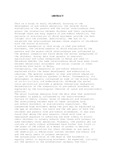| dc.description.abstract | This is a study on early childhood, focusing on the
development of pre-school education, the related child
evaluations of the parents and the social relationships that
govern the interaction between children and their caretakers.
Although there are many aspects of pre-school education, the
patterns of distribution of child enrolment provide the best
insight into the problem. Specifically, the aim is to
establish the relationships between these aspects of childhood
with the social structure.
A central assumption in this study is that pre-school
enrolment, the related aspects of child evaluations by the
parents and the parent-child relationships are influenced by
the general inequalities found among the social backgrounds of
the children. Survey data from parents in pastoral,
agricultural and urban backgrounds in Kenya are used to
determine whether the same relationships which have been found
between educational attainment and social classes in other
societies also exist in Kenya.
Conceptually, the expansion of pre-school education is
explained within the human development and modernization
theories. The general argument is that pre-school education
is part of the education systems in Kenya. Consequently, its
development is equally influenced by some of the strong forces
of nation-building and modernization. Although the social
class perspective provides a general theoretical background,
determination of the composition of pre-school enrolment is
explained by the sociological theories of value and socioeconomic
position.
The major findings emerging from the data show that preschool
enrolment is greatly influenced by the socio-economic
factors of family income, level of education and occupation.
The relationship between each of these variables with
pre-school enrolment is statistically significant. The
unexpected high enrolment among the poor may be explained by
the age of children, low costs and the net gain of both the
children and parents from pre-school attendance. It was also
found that among the poor parents, those with none or
negligible exposure to schooling are more likely to enroll
their children in nursery schools than those with primary or
some secondary level education. Probably, the parents who are
victims of early school withdrawal have either lost faith in
the power of the school as a means of access to desired
employment opportunities for their children or are aware of
the repetition in educational content between pre-school and
and the early years of primary education.
The occupational status of the head of the household is
equally useful in explaining enrolment. As expected, virtually
all the parents in the professional category had their
children enrolled while the labourer category had the lowest
percentage. What was not expected however was the very high
enrolment of children from the low income group among the
pastoralists although the low income group as a whole had a ""W _
high percentage of pre-school enrolment. _. a.
There lS also strong evidence that other factors, particularly
those related to various aspects of social structure such as
family, ethnicity and also ecological variations equally
affect child enrolment. Surprisingly one of the most important
findings is that the two parent family is as influential as
the income variable in explaining enrolment. In line with the
theory, this could mean that the two parent family, being more
integrated into the society is more responsive to the
education value.
-vii-
Another finding of theoretical significance is the
influence ethnicity has on enrolment. However, the interethnic
differences in enrolment among the intra-ethnic income
categories suggest that pre-school enrolment has acquired a
social class dimension in some ethnic communities but not in
others .
similarly, there is strong evidence suggesting that the
key attributes of the socialization process reflect the socioeconomic
differences found in the family background. It was
found that the values attached to children are closely related
with educational attainment of the parents. For instance, the
better educated parents preferred fewer children and engaged
children in domestic work only. In contrast, the poorly
educated parents prefer large families and have strong
instrumental value of children. These differences reflect the
physical environment and the class ideology of the two social
groups. However, the majority of the parents were eager to
assist their children with learning, irrespective of the
social class background. Although the social class factors
are important in understanding the development of pre-school
education, this study has established the influence of other
social ecological, determinations in pre-school education.... | |

